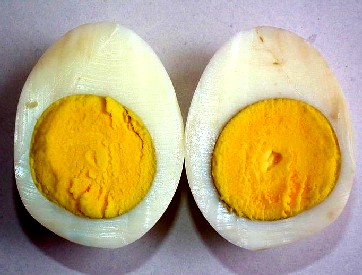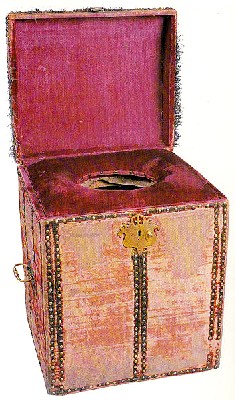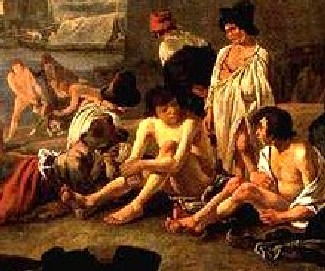
Fluxes/Diarrhea and Related Illnesses Page Menu: 1 2 3 4 5 6 7 8 9 10 11 Next>>
Treating Fluxes in the Golden Age of Piracy, Page 6
Treatment of a Flux: Food and Drink
There is a certain logic to the idea that what goes into a system that's not working properly could have an effect on what comes out of it. Period authors suggested several foods to to help stop fluxes.
Unlike the humoral treatments, which are primarily the purview of medical men, food was something understood by

Photographer: Toksave
A Sago Palm Harvested for Sago Production
everyone. So it was ripe for folk remedies which may be why several sailors offered their opinions on the topic. Amateur naturalist and journalist William Dampier noted in 1686 that "Sago [a starch extracted from the center of various tropical palm stems] which is transported into other parts of the East-Indies, is dried in small pieces... and [is] commonly eaten with Milk of Almonds, by those that are troubled with Flux; for it is a great binder, and very good in that Distemper."1 He also recommended some "sort of Plantains in that Island, which are shorter and less than the others, which I never saw any where but here [in Mindanao, Philippines]. These are full of black Seeds mixt quite through the Fruit. They are binding, and are much eaten by those that have Fluxes. The Country People gave them us for that use, and with good success."2
Merchant seaman Edward Barlow suggested that the 'gonfesus' of Brazil "which are much like a pear... [are] an excellent fruit against the flux, which is common in this country"3. What Barlow is talking about here is not entirely clear, although it may very well be the guava which is astringent and can thus be useful in a diarrhea.4
It wasn't just the sailors that were interested in local remedies for fluxes. Sea surgeon Thomas Aubrey likewise reported that the natives along the African Coast who were afflicted with a flux were "using in hopes of Relief, a certain Fruit called Guavers, of a styptick Quality."5

Photographer: Ramesh HG
A Hard Boiled Egg - Click Here for more on Eggs in Medicine
Physician William Cockburn explained that according to "the common People an Egg boiled in Vinegar, or Brandy, is a great Remedy for a Diarrhœa."6 Aubrey reported the same thing would stop the illness in people "troubled either with the Bloody or any other Flux"7.
Even when physicians and surgeons weren't quoting folk food remedies, their recommendations had a certain rustic feel to them. Similar to his recipe obtained from 'the common People', Cockburn reported that Dutch physician Pieter van Foreest "cured a Person who was desperately ill of a Lientery with the Yolk of an Egg, on which was the Powder of one Nutmeg; which Egg and Powder were afterwards roasted on a hot Tile or Brick."8 He also revealed that Italian physician Lucas Tozzi had cured a Lientery "with a salt Herring cut with Vinegar, though the sick Person was miserably afflicted with the Disease".9
For a Bloody Flux or Dysentery, Cockburn noted that Galen recommended drinking milk.10 Raymund Minderer expanded upon this prescribed drink, explaining that if a bloody flux "be without a Fever or heat, you may do much with new Milk, drinking it also mornings and evenings warm, some red-hot Stones having been mixed with it, to prevent curdling in your Stomach. ... If you add a little Album-græcum to it, 'twill be the better. I have my self done much good with thus prepared Milk"11.
Cockburn also said that according to physician Christopher Engelius, "there is not a more immediate and certain
Cure for a Dysentery, and every other Flux of Blood,

Photographer: Phil Sangwell
A Barley Ear
than Acorns."12 Although he quotes several physicians advice for binding foods, Cockburn doesn't recommend any himself, preferring to use other cures instead.
Sea surgeon John Moyle suggested a most thorough list of foods to his readers when treating a bloody flux. Let's finish with the menu suggested by him.
Let the Patient eat only fresh and wholesome Diet; Rice or husked Barley boyled are very proper; and eaten with fresh Butter, and a little fine Sugar.
So is a Fowl with its broth, without Salt or Pepper in it.
But of all other, Gelly-broths and agglutinative Food, are the fittest.
And Barley-water for his constant drink, with Harts-horn decocted in it, and Marygold flowers.13
It sounds like a pretty wholesome diet, at that!
1 William Dampier, Memoirs of a Buccaneer, Dampier’s New Voyage Round the World, p. 214; 2 Dampier, p. 217;3 Edward Barlow, Barlow's Journal of his Life at Sea in King's Ships, East and West Indiamen & Other Merchantman From 1659 to 1703, p. 86; 4 "Benefits of Guava in Diarrhea", www.personalfitness.org, gathered on 3/3/13; 5 Thomas Aubrey, The Sea-Surgeon or the Guinea Man’s Vadé Mecum., p. 75; 6 William Cockburn, The Nature and Cure of Fluxes, p. 131; 7 Aubrey, p. 72; 8 Cockburn, p. 234; 9 Cockburn, p. 234-5; 10 Cockburn, p. 290; 11Raymund Minderer, A Body of Military Medicines Experimented, Volume 4 of Paul Barbette's, Thesaurus Chirurgiæ, The Fourth Edition, p. 72; 12 Cockburn, p. 290; 13 John Moyle, The Sea Chirurgeon, p. 175-6
Treatment of a Flux: Fumigation
Fumigation was the practice of perfuming the air to help the sick by allowing them to breathe in the cure.

Close Stool, circa 1650
Given that bad air was commonly considered to be a cause of illness, it makes sense that they would believe good air should be the cure of an illness.
The best air was believed to be fresh and found on land. Since this could not be had on a ship, sea surgeons sometimes improvised by perfuming the environment around the ill patient. James Yonge gives an example of this in his Journal as his ship was returning to Tangier from Cales, Italy. "[W]e had many men sick of the scurvy, flux, and spotted fever. Our carpenter used to burn some sweet-smelling thing in a chaffing dish of coals in his cabin every morning to keep out infection"1.
The primary proponent of fumigation at sea was John Woodall. He advised "in all kindes of fluxes, fumigations are very good medicines, namely sitting over a close stoole, provided the sicke bee very warme kept, and not too hot, to which purpose a well burned bricke heat very hot and put under the stoole, laying two colde brickes under it, for burning the stoole, and then sprinckle often the hot brick with vineger if the disease be hot, or with vineger and Aqua vitæ ['water of life – Brandy]"2.
He also recommended the patient "sit over the fume of Franckencense or Amber with a chafing dish, and a few cooles [coals] in a close stoole is likewise very good"3as well as a "decoction of cynamon or cloves, or both together, or nutmegs set under the stoole, that the warm steam of the spices may come up into the body of the patient, is very good."4
1 James Yonge, The Journal of James Yonge [1647-1721] Plymouth Surgeon, p. 44; 2 John Woodall, the surgions mate, p. 210-1; 3 Woodall, p. 205; 4 Woodall, p. 211
Treatment of a Flux: Bathing
Closely related to fumigation is is therapeutic bathing. Bathing has a long history of being a medicinal cure dating back to the ancients Egyptians. Hippocrates advocated bathing in spring water, although he doesn't think it proper for people with fluxes.1
Still, in his thorough way, sea physician William Cockburn examines bathing as a cure because it "has often been praised with good Success in the Cure of a Loosness."2 He quickly finds that although baths "have been found useful in some Cases, ...they

Artist: Johannes Lingelbach
Bathing Gypsies (mid 17th c.)
are not so pressingly and effectually recommended as either purging, binding, or opiate Medicines: So they seem rather to have been tried in desperate Cases, than much to be depended on in our common Practice."3 Cockburn continues, explaining that it "is not a direct Method in the Cure of a Diarrhœa... as it neither destroys, nor carries off, the Stimulus, one general Cause of a Diarrhœa, nor restores the other Secretions."6 He finishes his consideration of the cure by flatly stating that "bathing can never Cure a Diarrhœa, because it is occasioned by a great Crudity of Blood, which is not helped by bathing."5
Even if it worked, bathing in refreshing springs seems far from a likely option for a sailor. Then again, seamen did have the advantage of traveling extensively and being able to reach locations reputed to contain healing waters. Sea captain Alexander Hamilton mentions the practice of bathing in Atcheem, Siam, explaining that "the River Waters are excellent for bathing. Washing in it before Sun-rising, and after setting, has cured inveterate Fluxes; and I have been told, that frequent Bathing has cur’d the Pox."2
It must be admitted, however, that pirates probably would not have had much access to or even interest in such things. Since none of our other period surgeons suggest bathing for the cure of fluxes and Cockburn dismissed it, we can safely state that it was probably not often used except, as Cockburn put it, 'in desperate cases.' So much for bathing.
1 Hippocrates, "On Regimen in Acute Diseases, The Genuine Works of Hippocrates, Vol. 1, Translated by Francis Adams, p. 305; 2 Alexander Hamilton, British sea-captain Alexander Hamilton's A new account of the East Indies, 17th-18th century, p. 404; 3 William Cockburn, The Nature and Cure of Fluxes, p. 98; 4 Cockburn, p. 135; 5 Cockburn, p. 135; 6 Ibid.
Treatment of a Flux: Exercise
"There is no want, says the great Celsus, of walking nor of rubbing in this Distemper [diarrhea]; it may be useful to ride in a Chariot, or rather a Horse-back; for there is nothing that strengthens the Guts more." (William Cockburn, The Nature and Cure of Fluxes, p. 137)
A rather unusual suggestion for treatment is that of exercise. particularly horseback riding. Physician William Cockburn gives

Artist: Aelbert Cuyp
Perhaps if you combined the two exercises? From
Lady and
Gentleman on Horseback (1655)
some thought to exercise as a treatment for a diarrhea, probably because it was the revered ancient writer Aulus Celsus who suggested it. Still, after considering the use of a coach ride in place of going about on horseback, Cockburn admits that it's "useful to ride in a Coach, but it is more to get a Horse back; because nothing strengthens the Bowels more than riding."1
He considers another form of exercise - a 'sovereign remedy' - recommended by several ancient physicians: coation. (After all, it cures everything, at least for its duration.) However attractive that prospect may appear on its surface, however, Cockburn finally decides that Hippocrates is not in favor of it or horseback riding and the other authors must be incorrect.2
You may be thinking that It would be ridiculous to consider horseback riding at sea. Although we do have an account of pirate Captain Spriggs' crew riding horses "about the Deck backwards and forwards a full Gallop, like Mad-men at Newmarket"4, this appeared to have nothing whatsoever to do with curing a flux. So you're probably right.
Cockburn later comes out more strongly against exercise as a cure, giving a most thorough explanation as to why. "Exercise accelerates the Liquors of the Body, and makes so great a Separation of all of them, that the Body is rendered thin and lifeless under a long Continuance of the more violent Exercises: These were never designed in any Degree for curing a Disease, however useful they were believed to be for keeping Men in the present State of Health they possess'd"3.

Author William Hutchinson
Even so, exercise to cure fluxes is proposed by privateer and Liverpool Dockmaster William Hutchinson.
As he explains, a "quick and easy cure I met with in the height of this disease, I think deserves mentioning. When I was obliged to have a painful motion every quarter of an hour, and durst not expose myself to the least air of wind, I was told of ships that were coming into the bay [at Liverpool], without first sending in their boats, as usual, to make known who they were; and being then by turn (as was customary) deputed commodore, I gave orders to fire at them; which they not paying regard to, but continuing to run in, it alarmed and roused me to action, and I was four hours afterwards without going to stool; and then I had a favourable one, and soon got well. So that we may sometimes be roused into action greatly to our advantage."5
1 William Cockburn, The Nature and Cure of Fluxes, p. 97; 2 Cockburn, p. 97-8; 3 Cockburn, p. 139; 4 Captain Charles Johnson, A General History of the Pirates, 3rd Ed., p. 416; 3Johnson,p. 74; 5 William Hutchinson, A Treatise On Practical Seamanship, p. 276-7

